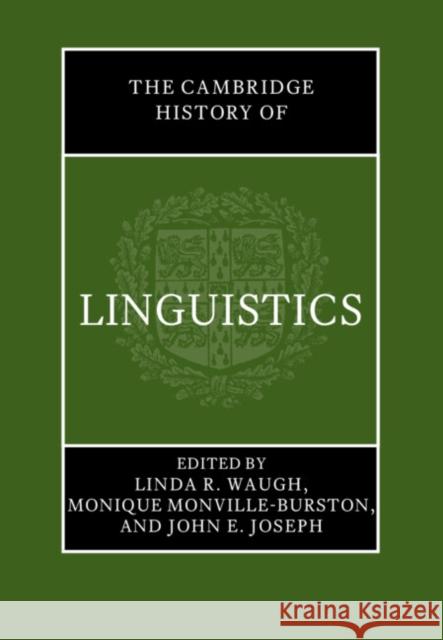The Cambridge History of Linguistics » książka



The Cambridge History of Linguistics
ISBN-13: 9780521849906 / Angielski / Twarda / 2023 / 241 str.
The Cambridge History of Linguistics
ISBN-13: 9780521849906 / Angielski / Twarda / 2023 / 241 str.
(netto: 558,38 VAT: 5%)
Najniższa cena z 30 dni: 579,21
ok. 16-18 dni roboczych.
Darmowa dostawa!
Covers significant aspects of important traditions and perspectives in the history of linguistics, including recent history.
'The Cambridge History of linguistics is an impressive one-volume accomplishment which is remarkable by its depth - it spans more than twenty centuries of learned thinking about language - by its breadth - across centuries and across continents - and by the diversity of its themes - a fresco across centuries with a large section devoted to present-day linguistics and interdisciplinary work on language.' Georges Daniel Veronique, Professor emeritus, Aix-Marseille Université
Introduction: Linda R. Waugh and Monique Monville-Burston; Part I. Ancient, Classical and Medieval Periods: Introduction to Part I: The emergence of linguistic thinking within premodern cultural practices Mark Amsler: 1. Ancient near eastern linguistic traditions: Mesopotamia, Egypt Christopher Woods Andréas Stauder; 2. East Asian early linguistic traditions: China; Korea and Japan Alain Peyraube, Hilary M. Chappell and Alexander Vovin; 3. History of linguistic analysis in the Sanskrit tradition in premodern India, with a brief discussion of vernacular grammars Madhav M. Deshpande; 4. Greek linguistic thought and its Roman reception Roger D. Woodard; 5. Early to late medieval Europe Louis G. Kelly; 6. Near eastern linguistic traditions Monique Monville-Burston and Linda R. Waugh; 6A. The Syriac linguistic tradition Peter T. Daniels; 6B. The Hebrew linguistic tradition José Martínez Delgado; 6C. The Arabic linguistic tradition Kees Versteegh; Part II. Renaissance to Late Nineteenth century: Introduction to Part II: The cultural and political context of language studies from the renaissance to the end of the nineteenth century Lia Formigari; 7. Universal language schemes Jaap Maat and David Cram; 8. Locke and reactions to Locke, 1700-1780 Nicholas Hudson; 9. Rousseau to Kant Gerda Haßler; 10. The celebration of linguistic diversity: Humboldt's anthropological linguistics Jürgen Trabant; 11. Early nineteenth century linguistics Hans Henrich Hock; 12. The Neogrammarians and their role in the establishment of the science of linguistics Kurt Jankowsky; Part III. Late Nineteenth through Twentieth Century Linguistics: Introduction to Part III: Late nineteenth through twentieth century linguistics: Synopsis of major trends Monique Monville-Burston and Linda R. Waugh ; III-A. Late nineteenth century through the 1950s: Synchrony, autonomy and structuralism; 13. Move to synchrony: late nineteenth century to early twentieth century Piet Desmet and Stijn Verleyen; 14. Structuralism in Europe Daniele Gambarara, Emanuele Fadda, Lorenzo Cigana and Patrick Sériot; 15. British linguistics Michael K C MacMahon, Tony McEnery and Andrew Hardie; 16. American linguistics to 1960: Science, data, method Julia S. Falk; III-B. To 2000: Formalism, cognitivism, language use and function, interdisciplinarity; 17. Chomsky and the turn to syntax, including alternative approaches to syntax Frederick Newmeyer; 18. Functionalist dimensions of grammatical and discourse analysis Deborah Schiffrin, Colleen Cotter and Andrea Tyler; 19. Semantics and pragmatics Keith Allan; 20. Language and philosophy, from Frege to the present Jean-Michel Fortis, Bruno Ambroise, Jacqueline Léon and Mathieu Marion; 21. Lexicology and lexicography Alain Polguère; 22. Generative phonology: its origins, its principles and its successors John A. Goldsmith and Bernard Laks; 23. Phonetics and experimental phonology, circa 1950–2000 John Coleman; 24. Historical and universal-typological linguistics Anna Siewierska; 25. Language and society Florian Coulmas; 26. Language and anthropology Alessandro Duranti and Rachel George; 27. Language and psychology, 1950–present A brief overview Morton Ann Gernsbacher and Michael P. Kaschak; 28. Semiotics Winfred Nöth; 29. Applied linguistics Kees de Bot and Margaret Thomas; References; Index.
1997-2026 DolnySlask.com Agencja Internetowa
KrainaKsiazek.PL - Księgarnia Internetowa









